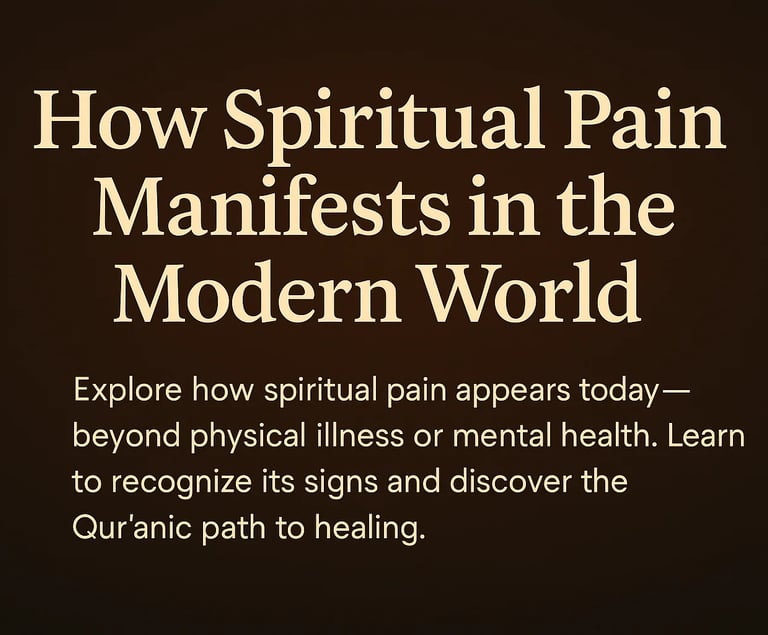Blog
How Spiritual Pain Manifests in the Modern World
Discover how spiritual pain shows up today—through anxiety, isolation, or burnout. Learn Islamic insights and healing steps to restore your inner peace.
Explore how spiritual pain appears today—beyond physical illness or mental health. Learn to recognize its signs and discover the Qur’anic path to healing.


How Spiritual Pain Manifests in the Modern World
Introduction
Not all pain is physical—and not all suffering is visible. In a modern world dominated by science and psychology, spiritual pain is often ignored, mislabeled, or medicated. But Islam teaches us that the soul, just like the body and mind, can suffer—and when it does, the signs are subtle, yet deeply disruptive.
1. Feeling Empty Despite ‘Having It All’
You have a good job, stable income, and people around you—but there’s a persistent void you can’t explain. This emptiness is a sign that your soul is hungry. When the heart is disconnected from Allah, no worldly success can fill it.
“Verily, in the remembrance of Allah do hearts find rest.” — Qur’an, 13:28
2. Chronic Anxiety with No Root Cause
You feel on edge, restless, or fearful, even when life seems okay. Doctors may say it's anxiety or trauma, but sometimes the soul is reacting to unseen forces—such as jinn influence, the evil eye, or unresolved spiritual wounds.
3. Emotional Outbursts or Uncontrollable Sadness
Tears come without a reason. Rage bursts from nowhere. One minute you’re fine, the next you're overwhelmed. These mood swings might not be mental illness—they could be signs of spiritual imbalance or attack.
4. Detachment from Faith and Worship
You want to pray—but something pulls you away. You open the Qur’an and feel resistance. Going to the masjid feels heavy, and dhikr becomes a chore. This spiritual lethargy can be a sign that your connection with Allah has been weakened, or that a spiritual force is interfering.
5. Physical Symptoms with No Medical Explanation
Migraines. Chest tightness. Stomach pain. Exhaustion. You've done all the tests—and doctors find nothing. When the soul is in distress, the body reacts. This is why ruqyah begins where medicine ends.
6. Nightmares, Sleep Paralysis, and Disturbed Rest
Waking up at night in fear, seeing shadows, or being unable to move during sleep are classic signs of spiritual distress—especially if recurring. In Islam, dreams are not just random—they can reflect the unseen world’s influence.
7. Isolation and Feeling Spiritually “Lost”
You begin to withdraw from people, avoid conversations, and feel like no one understands what you're going through. The world feels meaningless. This spiritual numbness often signals a deep disconnection that needs healing.
What Can You Do?
Reconnect with the Qur’an daily—even if it’s just one verse.
Establish salah and stick to it, even during emotional lows.
Recite ruqyah verses and protect your home with Adhkar.
Avoid harmful coping mechanisms like music, distractions, or occult practices.
Seek support from a knowledgeable, sincere ruqyah healer grounded in Sunnah.
Final Words
Spiritual pain is real—and it can ruin lives if left untreated. But Islam doesn’t just diagnose it—it offers a cure. Through remembrance, prayer, and healing from the Qur’an, the soul can find peace again.
“Indeed, with hardship comes ease.” — Qur’an, 94:6
